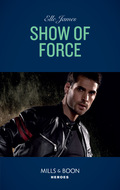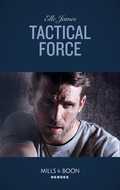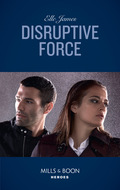Książki nie można pobrać jako pliku, ale można ją czytać w naszej aplikacji lub online na stronie.
Czytaj książkę: «Driving Force»
With no identity, memory or past...
She must trust a stranger in order to survive.
When a woman is caught shadowing the team leader of Declan’s Defenders, she slams right into the man’s protection detail—and a former elite Force Recon marine. Gus Walsh’s instincts tell him she is dangerous in more ways than one. Yet when he discovers that she is a Jane Doe with no memory of who she is or why someone is hunting her, the pair must team up to find answers. But there’s no guarantee they will survive the truth once the dust settles...
ELLE JAMES, a New York Times bestselling author, started writing when her sister challenged her to write a romance novel. She has managed a full-time job and raised three wonderful children, and she and her husband even tried ranching exotic birds (ostriches, emus and rheas). Ask her, and she’ll tell you what it’s like to go toe-to-toe with an angry three-hundred-and-fifty-pound bird! Elle loves to hear from fans at ellejames@earthlink.net or ellejames.com
Also by Elle James
Marine Force Recon
Show of Force
Full Force
One Intrepid SEAL
Two Dauntless Hearts
Three Courageous Words
Four Relentless Days
Five Ways to Surrender
Six Minutes to Midnight
Hot Combat
Discover more at millsandboon.co.uk.
Driving Force
Elle James

ISBN: 978-1-474-09437-5
DRIVING FORCE
© 2019 Mary Jernigan
Published in Great Britain 2019
by Mills & Boon, an imprint of HarperCollins Publishers 1 London Bridge Street, London, SE1 9GF
All rights reserved including the right of reproduction in whole or in part in any form. This edition is published by arrangement with Harlequin Books S.A.
This is a work of fiction. Names, characters, places, locations and incidents are purely fictional and bear no relationship to any real life individuals, living or dead, or to any actual places, business establishments, locations, events or incidents. Any resemblance is entirely coincidental.
By payment of the required fees, you are granted the non-exclusive, non-transferable right and licence to download and install this e-book on your personal computer, tablet computer, smart phone or other electronic reading device only (each a “Licensed Device”) and to access, display and read the text of this e-book on-screen on your Licensed Device. Except to the extent any of these acts shall be permitted pursuant to any mandatory provision of applicable law but no further, no part of this e-book or its text or images may be reproduced, transmitted, distributed, translated, converted or adapted for use on another file format, communicated to the public, downloaded, decompiled, reverse engineered, or stored in or introduced into any information storage and retrieval system, in any form or by any means, whether electronic or mechanical, now known or hereinafter invented, without the express written permission of publisher.
® and ™ are trademarks owned and used by the trademark owner and/or its licensee. Trademarks marked with ® are registered with the United Kingdom Patent Office and/or the Office for Harmonisation in the Internal Market and in other countries.
Version: 2020-03-02
MILLS & BOON
Before you start reading, why not sign up?
Thank you for downloading this Mills & Boon book. If you want to hear about exclusive discounts, special offers and competitions, sign up to our email newsletter today!
Or simply visit
Mills & Boon emails are completely free to receive and you can unsubscribe at any time via the link in any email we send you.
Note to Readers
This ebook contains the following accessibility features which, if supported by your device, can be accessed via your ereader/accessibility settings:
Change of font size and line height
Change of background and font colours
Change of font
Change justification
Text to speech
I dedicate this book to Sweetpea, a good dog who gave
me lots of love and companionship for thirteen years.
For one so small, you were a big part of my life and
heart. I hope you’re running free and eating all the
good treats across the rainbow bridge. I will miss you
so very much.
Contents
Cover
Back Cover Text
About the Author
Booklist
Title Page
Copyright
Note to Readers
Dedication
Chapter One
Chapter Two
Chapter Three
Chapter Four
Chapter Five
Chapter Six
Chapter Seven
Chapter Eight
Chapter Nine
Chapter Ten
Chapter Eleven
Chapter Twelve
Chapter Thirteen
Chapter Fourteen
About the Publisher
Chapter One
She struggled to surface from the black hole trying to suck her back down. Her head hurt and she could barely open her eyes. Every part of her body ached so badly she began to think death would be a relief. But her heart, buried behind bruised and broken ribs, beat strong, pushing blood through her veins. And with the blood, the desire to live.
Willing her eyes to open, she blinked and gazed through narrow slits at the dirty mud-and-stick wall in front of her. Why couldn’t she open her eyes more? She raised her hand to her face and felt the puffy, blood-crusted skin around her eyes and mouth. When she tried to move her lips, they cracked and warm liquid oozed out onto her chin.
Her fingernails were split, some ripped down to the quick and the backs of her knuckles looked like pounded hamburger meat. Bruises, scratches and cuts covered her arms.
She felt along her torso, wincing when she touched a bruised rib. As she shifted her search lower, her hands shook and she held her breath, feeling for bruises, wondering if she’d been assaulted in other ways. When she felt no tenderness between her legs, she let go of the breath she’d held in a rush of relief.
She pushed into a sitting position and winced at the pain knifing through her head. Running her hand over her scalp, she felt a couple of goose-egg-sized lumps. One behind her left ear, the other at the base of her skull.
A glance around the small, cell-like room gave her little information about where she was. The floor was hard-packed dirt and smelled of urine and feces. She wore a torn shirt and the dark pants women wore beneath their burkas.
Voices outside the rough wooden door made her tense and her body cringe.
She wasn’t sure why she was there, but those voices inspired an automatic response of drawing deep within, preparing for additional beatings and torture.
What she had done to deserve it, she couldn’t remember. Everything about her life was a gaping, useless void.
The door jerked open. A man wearing the camouflage uniform of a Syrian fighter and a black hood covering his head and face stood in the doorway with a Russian AK-47 slung over his shoulder and a steel pipe in his hand.
Her body knew that pipe. Every bruise, every broken rib screamed in pain. She bit down hard on her tongue to keep from letting those screams out. Scrambling across the floor, she moved to the farthest corner of the stinking room and crouched, ready to fight back. “What do you want?” she said, her voice husky, her throat dry.
The man shouted, but strangely, not in Syrian Arabic. He shouted in Russian. “Who are you? Why are you here? Who sent you?”
Her mind easily switched to the Russian language, though she couldn’t remember how she knew it. In her gut, she knew her native language was English. Where had she learned to understand Russian? “I don’t know,” she responded in that language.
“Lies!” the man yelled and started toward her, brandishing the steel rod. “You will tell me who you are or die.”
She bunched her legs beneath her, ready to spring.
Before he made it halfway across the room an explosion sounded so close, the ground shook, the walls swayed and dust filled the air. Another explosion, even closer, shook the building again.
The man cursed, spun and ran from the room, slamming the door shut behind him.
Her strength sapped, she slumped against the wall, willing the explosions to hit dead-on where she stood to put her out of her misery. She didn’t think she would live through another beating, which was sure to come, because she didn’t have the answers the man wanted. No matter how hard she tried to think, she couldn’t remember anything beyond waking up in her tiny cell, lying facedown in the dirt.
Another explosion split the air. The wall beside her erupted, caving into the room. She was thrown forward, rubble falling on and around her. Dusty light spilled into the room through a huge hole in the wall.
Pushing the stones, sticks and dirt away from her body, she scrambled to her feet and edged toward the gap. The explosion had destroyed the back of the building in which she’d been incarcerated. No one moved behind it.
Climbing over the rubble, she stuck her head through the hole and looked right and left at a narrow alley down below.
At the end of the alley was a dirt street. Men, covered in dust and carrying weapons, ran along the street, yelling. Some carried others who had been injured in the explosions. The sound of gunfire echoed through the alley and the men threw themselves to the ground.
She ducked back inside the hole, afraid she’d be hit by the bullets. But then she realized she’d rather be shot than take another beating. Instead of waiting around for her attacker to return, she pulled herself through the gap and dropped to the ground. A shout sounded on the street at the other end of the alley. She didn’t wait to find out if the man was shouting at her; she turned the opposite direction and ran.
At the other end of the alley, a canvas-covered truck stood, the back overflowing with some kind of cut vegetation, dried leaves and stalks. With men shouting and brandishing weapons all around her, she wouldn’t last long out in the open. She dove into the back of the truck and buried herself beneath the stems and leaves.
A metal door opened and slammed shut, the truck’s engine roared to life and the vehicle rolled along the street. With no way to see where they were headed, she resigned herself to going along for the ride. Anywhere had to be better than where she’d been.
As she lay beneath the sticks and leaves, she realized they were drying stalks of marijuana, a lucrative crop for Syrian farmers. Where they were taking their crop, she didn’t know. Hopefully, far enough away from the people who’d held her hostage. She touched her wrist where the skin had been rubbed raw, probably from having been tied with abrasive rope. In the meager light penetrating her hiding place, she noticed a tattoo on the underside of her wrist below the raw skin. She pushed the leaves aside to allow more light to shine in on what she recognized as a three-sided Trinity knot. Below the knot were a series of lines and shapes.
The more she tried to decipher the symbols, the more her head ached, and her eyes blurred. The tattoo wouldn’t rub off. Since it was permanent, she should know what the knot and the symbols stood for. No matter how hard she tried to remember, she couldn’t.
The rumble of the engine and the rocking motion of the truck lulled her into a fitful sleep, broken up by sudden jolts when the truck encountered a particularly deep pothole.
What felt like hours later, the vehicle rolled into what appeared to be the edge of a town.
If she planned on leaving the truck, she needed to do it before they stopped and found her hiding in the marijuana.
She dug her way out of the sticks and leaves, crawled to the tailgate and peered out between slitted, swollen eyelids.
The truck had slowed at an intersection in a dirty, dingy area of the town. With a dark alley to either side, this might be her only chance to get out unnoticed.
As the truck lurched forward, she rolled over the tailgate, dropped to the ground and ducked into a shadowy alley. With her face bruised and bleeding, she wouldn’t get far without attracting attention. But she had to get away from the truck and figure out where to go from there.
Turning left at the end of a stucco tenement building, she crossed a street and ducked back into a residential area. Between apartment buildings, lines were hung with various items of clothing, including a black abaya cloak. Glancing left, then right, she slowed, then walked up to the clothesline, pulled off the black abaya and walked away as if she owned it.
A shout behind her made her take off running. She turned at the end of the building and shot a glance over her shoulder. An older woman stood beneath the space where the abaya had been. She wore another abaya and shook her fist.
“Sorry,” she murmured, but she had to do something. With no money, no identification and a face full of bruises, she couldn’t afford to be seen or stop to ask for help.
The salty scent of sea air and the cry of gulls gave her hope. If she were at a port town, she might find a way to stow away on a ship. But where should she go? She didn’t know who she was, or where she belonged, but one thing she was very certain about, despite the fact she could understand Syrian Arabic and Russian, was that she was American. If she could get back to America, she’d have a better chance of reconstructing her identity, her health and her life.
Dressed in the abaya, she pulled the hood well over her head to shadow her battered face and wandered through neighborhoods and markets. Her stomach rumbled, the incessant gnawing reminding her she hadn’t eaten since the last meal the guards had fed her in her little prison two days ago. Moldy flat bread and some kind of mashed chickpeas. She’d eaten what she could, not knowing when her next meal might come. She needed to keep up her strength in the event she could escape. And she had.
Walking through the thriving markets of a coastal town, everything seemed surreal after having been in a war-damaged village, trapped in a tiny cell with a dirt floor.
As she walked by a fruit stand in a market, she brushed up against the stand and slipped an orange beneath her black robe. No one noticed. She moved on. When she came to a dried-fruit-and-nuts stand, she palmed some nuts. With her meager fare in her hands, she left the market and found a quiet alley, hunkered down and ate her meal.
Her broken lips burned from the orange juice, but it slid down her throat, so refreshing and good, she didn’t care. The nuts would give her the protein she needed for energy.
What she really wanted was a bath.
Drawn to the water, she walked her way through the town to the coastline, learning as she went that she was in Latakia, Syria, a thriving party town on the eastern Mediterranean Sea. People from all over Syria came to this town to escape the war-torn areas, if only for a few days.
The markets were full of fresh produce and meats, unlike some of the villages where fighting had devastated homes and businesses.
Women dressed in a variety of ways from abayas that covered everything but the eyes to miniskirts and bikinis. No one noticed her or stopped her to ask why her face was swollen and bruised. She kept her head lowered and didn’t make eye contact with anyone else. When she finally made it to the coastline, she followed the beach until it ran into the shipyards where cargo was unloaded for sale in Syria and loaded for export to other countries.
By eavesdropping, she was able to ascertain which ship was headed to the US later that night. All she had to do was stow away on board. She wasn’t sure how long it would take to cross the ocean, so she’d need a stash of food to see her through.
Back out to the markets, she stole a cloth bag and slowly filled it, one item at a time, with fruit, nuts and anything else she could hide beneath her abaya.
At one fruit stand, the proprietor must have seen her palm a pomegranate. He yelled at her in Arabic and grabbed her shoulder.
She side-kicked the man, sending him flying back into a display of oranges. The wooden stand collapsed beneath his weight, scattering the fruit into the walkway.
Not knowing how severe punishment was for stealing in Syria, she ran until she was far enough away, and she was certain no one followed.
With a small collection of food in her bag, she made her way back to the ship sailing later that evening to the US. Containers were being loaded by huge cranes. She found one that she was able to get inside and thought better of it. She could get in but couldn’t secure the door. And if someone else secured it, she’d be locked in until the outer door was opened at the destination. Some containers weren’t unloaded until they reached their final destinations...months later.
A container like that wasn’t worth dying in. She’d have to find another way. The gangway onto the ship was her only other choice, and it was out in the open. She would never make it aboard in an abaya.
Waiting in the shadows of the containers she watched the men going aboard and leaving the ship. Some wore hats to shade their eyes. Others wore uniforms of the ship line or dock workers’ company.
In the late afternoon, some of the men took time to eat dinner. One in particular found a shady spot to open the bag containing his meal. He sat by himself, out of view of the others in his own little patch of shade, seeming grateful for some relief from the baking afternoon sun. He wore a uniform shirt embroidered with the logo of the ship line and a hat emblazoned with the same. As he settled with his dinner, he shed his outer shirt and hat, preferring to sit in the cool spot in a tee, soaked in sweat.
Another man called out for assistance getting a container door shut.
The guy eating his dinner lumbered to his feet, leaving his shirt, hat and food in the shade. He trudged toward the other man, without looking back.
Providence.
She gave a silent prayer of thanks as she sneaked up, took the shirt, hat, chunk of bread and a plastic water bottle, disappearing before the man had a chance to return.
Though the shirt was sweaty and too big for her, it would hide any female assets and help her to look more like a man. She shoved her hair up into the baseball cap and pulled it down over her forehead enough to shadow her swollen eye.
Now, all she had to do was wait for it to get a little darker. Not too long, or they’d pull up the gangway and set sail without her. She had to get back to the US soon. If the people who’d captured her discovered where she was, she would not be safe in Syria.
Shadows lengthened with the sun angling toward the sea. The crane continued loading containers all through the day and into the evening. Men boarded and left the ship.
She waited until there was a gap in people coming and going. Pulling the cap down low over her eyes, she tucked the cloth bag full of food beneath the baggy shirt and walked across the gangway as if she belonged, hoping she appeared to be an older, slightly heavyset man getting back to work aboard the ship.
No one stopped her on the gangway.
Once aboard, she found a stairwell and descended below deck. As she went down, a man came out of a hallway several steps below.
Her heart jumped into her throat as the guy took the steps two at a time. Fortunately, he was in a hurry and ran past her without commenting. She looked away hoping he wouldn’t notice she was a female with a battered face. Once she’d passed him, she let out the breath she’d been holding and hurried downward to the lowest deck she could go. Then she dodged between containers in the hull until she found a dark corner near the back. Hunkering low and pressing her body against a container, she prayed they would finish loading soon and leave port.
She must have fallen asleep while waiting. When she woke, the ship rocked gently beneath her, the rumble of an engine letting her know they were underway.
For more than a week, she rationed her food, sneaked into the galley in the middle of the night and scrounged for food and water. Like a rat lining her nest, she found a blanket and a pillow in a closet near to the crew’s quarters. In the middle of the night, she used the facilities, and though she didn’t feel she could linger long enough for a shower, she did manage to clean up, using a washrag and a towel.
The long journey across the water took ten long days. She filled her days trying to learn more about the ship and where it was going. Remaining undetected became a game she got very good at.
When she ventured out of her dark hole into some light, she studied the tattoo on her wrist, recognizing the squiggly lines as numbers in Hebrew. The more she contemplated them, the more her gut told her they were a set of coordinates.
When the ship finally pulled into port, she’d determined they were docking at one near Norfolk, Virginia.
As soon as she was able to sneak away, she walked into town and bought a T-shirt from a tourist vendor and jeans from a used clothing consignment store, using money she’d pilfered from workers on the ship. She ditched her uniform in a trash can and tugged on the tee and jeans in an alley. From there, she quickly found a library with computers and keyed in the numbers to find the coordinates. She learned the street address and searched county tax records to discover who lived at that street address.
A Charlotte Halverson lived there, and from the satellite street view of the location, the Halverson estate was a veritable fortress. If she wanted to get to Charlotte Halverson, she’d have to scale a wall, fight her way past security and possibly guard dogs. And for what? To tell a woman who likely didn’t know her that she’d found her because of the GPS coordinates tattooed to her wrist?
A quick check on who exactly Charlotte Halverson was didn’t make her feel any better about trespassing on the woman’s property. She was a very wealthy widow, who employed a number of bodyguards, based on the photos of her attending various events in the DC area.
In fact, one news article reported she was scheduled to attend an upcoming charity ball at one of the swanky hotels in DC.
Getting past a stone wall and guard dogs might be extremely difficult, but she damn well could get past the security at a hotel. The event was the next night. That gave her a day and a half to get from Norfolk to DC and find her way into that hotel to get an audience with Ms. Halverson.
She prayed the woman could help her solve the mystery of just who the heck she was.





